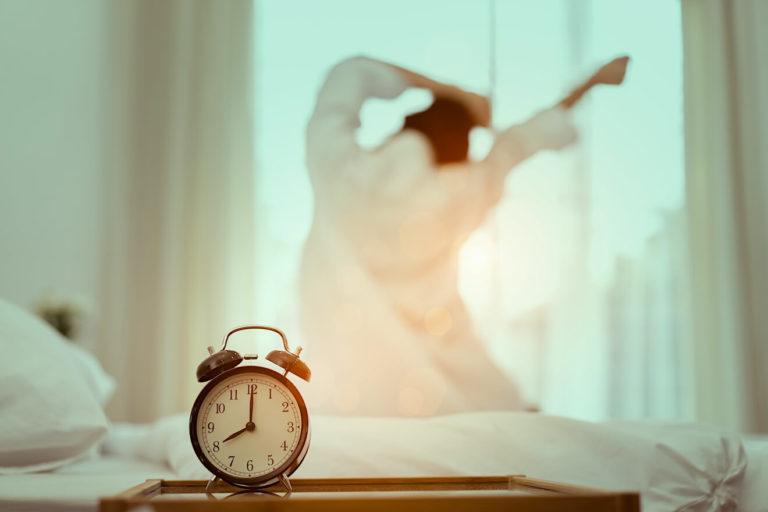
Many people suffer from sleep issues. According to the latest data, insomnia impacts millions of people. Up to 50 percent of people experience insomnia at some point in their lives.
It’s no secret that insomnia can impact your physical health, but it also harms emotional well-being. Difficulty staying asleep, falling asleep, or early awakening can impact your mental health. Improved sleep, on the other hand, leads to better mental health.
Sleep and Mental Health
Research from the American Psychological Association reveals that a lack of sleep and broken-up sleep raise anxiety levels and negatively impact mood. This study indicates that getting at least seven hours of sleep per night is critical for mental health.
When you don’t get enough sleep, key areas of the brain involved in processing emotions become more reactive. This leads to difficulty in managing thoughts, feelings, and behaviors.
Also, mental health problems like depression, anxiety, and bipolar disorder may impact sleep.
Anxiety Disorders
Sleep disturbances are particularly prevalent in anxiety disorders. Anxiety may cause racing thoughts which can keep you awake. Distress about falling asleep can make it even harder to fall asleep. Anxiety can also make it harder to stay asleep. People with anxiety disorders may have nightmares, which can impact sleep.
Depression
Depression can cause insomnia. Among people with depression, 80 percent have trouble staying or falling asleep. Difficulty falling asleep is closely associated with depression as is early awakening. Depression can also make you stay in bed longer and sleep more. This is called hypersomnia. People with depression may go back and forth between insomnia and hypersomnia.
Bipolar Disorder
Bipolar disorder significantly impacts sleep. Mania, which is part of bipolar disorder, may increase energy so a person may not feel tired. A person with bipolar disorder may not feel tired the next day, despite having little or no sleep. For people with bipolar, a lack of sleep may cause moodiness, depression, and trouble concentrating.
Seasonal Affective Disorder (SAD)
Seasonal affective disorder is a condition where people experience depressive symptoms that occur when the seasons change. This disorder occurs because of a lack of sunlight. Up to 70 percent of people with SAD have a sleep disorder.
Mental Health Treatments That Can Help
If you have a mental health disorder, it’s important to treat it. This can help improve sleep. Transcranial magnetic stimulation or TMS is very effective for the treatment of depression, anxiety, and sleep disorders. TMS is a non-invasive treatment that has no side effects.
Repetitive transcranial magnetic stimulation (rTMS) is another treatment that is very effective for depression and sleep. One study examined the impact of repetitive transcranial magnetic stimulation on mood and sleep quality in patients with major depressive disorder. It was found that rTMS improved both sleep and mood in patients with depression.
Behavioral Strategies for Improving Sleep
Besides seeking help for mental health conditions, there are a variety of things that you can do to get better sleep every night. Here are some tips:
Aim for 7 to 8 Hours of Sleep A Night
Set a bedtime that allows you to get at least seven hours of sleep. This is just a general guideline. Some people might need less sleep than this while others might need more. Aim for at least seven hours a night. If you don’t feel well-rested, then increase your sleep to eight hours.
Don’t Self-Medicate
If you have trouble sleeping, you might be tempted to take something to help you sleep. It’s common for people who have trouble sleeping to try over-the-counter (OTC) sleep aids initially.
You might even consider drinking alcohol to fall asleep. However, self-medicating can make sleep problems worse. Alcohol disrupts the sleep-wake cycles. Over-the-counter sleep medications are not the answer either. Over time, these pills can make sleep problems worse.
The use of natural OTC sleep aids can be considered for short-term use. You may consider a trial of Sip2Sleep®, which is a completely natural product containing two natural ingredients that has been clinically proven to improve insomnia and next day functioning but also to reduce next day anxiety as well.
Limit Daytime Naps
Short daytime naps less than 30 minutes at least six hours before bedtime are okay for sleep. However, long or frequent naps taken later in the day can cause insomnia. Keep naps short. The longer you nap, the more likely you are to feel groggy afterward. Try to nap before 3:00 PM. Naps after that time can interfere with sleep.
Avoid Caffeine Close to Bedtime
Consuming coffee, tea, or soda too close to bedtime can make it difficult to fall asleep. The recommended cut-off time for caffeine is eight hours before bedtime. So, if you typically go to bed at 10 PM, stop drinking caffeinated beverages at 2 PM. If you still struggle to go to sleep, stop caffeine use 10 hours before bedtime.
Stick to a Nightly Routine
Establish a relaxing bedtime routine that helps you wind down after a busy day. A bedtime routine tells your body and brain that it’s time for bed. This can have a big impact on falling and staying asleep. Set aside 30 minutes to one hour each day before bed for your nighttime routine. Your routine can include things like:
- Turning off electronic devices
- Meditating or practicing bedtime yoga
- Reading a book
- Putting on some calming music or nighttime sounds
- Taking a warm, relaxing bath
- Dimming the lights
- Turning the thermostat down
Set a Regular Wake Time
If you want to sleep well regularly, one of the most important things that you can do is to wake up at the same time each day. Your circadian rhythm is influenced by your wake-up time. Waking up at the same time every day can reinforce your circadian rhythm. It makes it easier to get up and leads to less sleep deprivation. Therefore, it’s important to get up at the same time —even on weekends and holidays.
Final Thoughts
Sleep and mental well-being are closely intertwined. People with mental health issues are more likely to suffer from insomnia and other sleep problems. On the other hand, difficulty sleeping can impact mental health. When you are tired, you are more likely to feel irritable and moody. There is an excellent article recently published reviewing the more detailed relationship between sleep and mental health.
Transcranial magnetic stimulation (TMS) helps treat both depression and other mental health disorders, as well as helping with insomnia and other sleep problems.
Contact the TMS Institute of Arizona to schedule a consultation.













